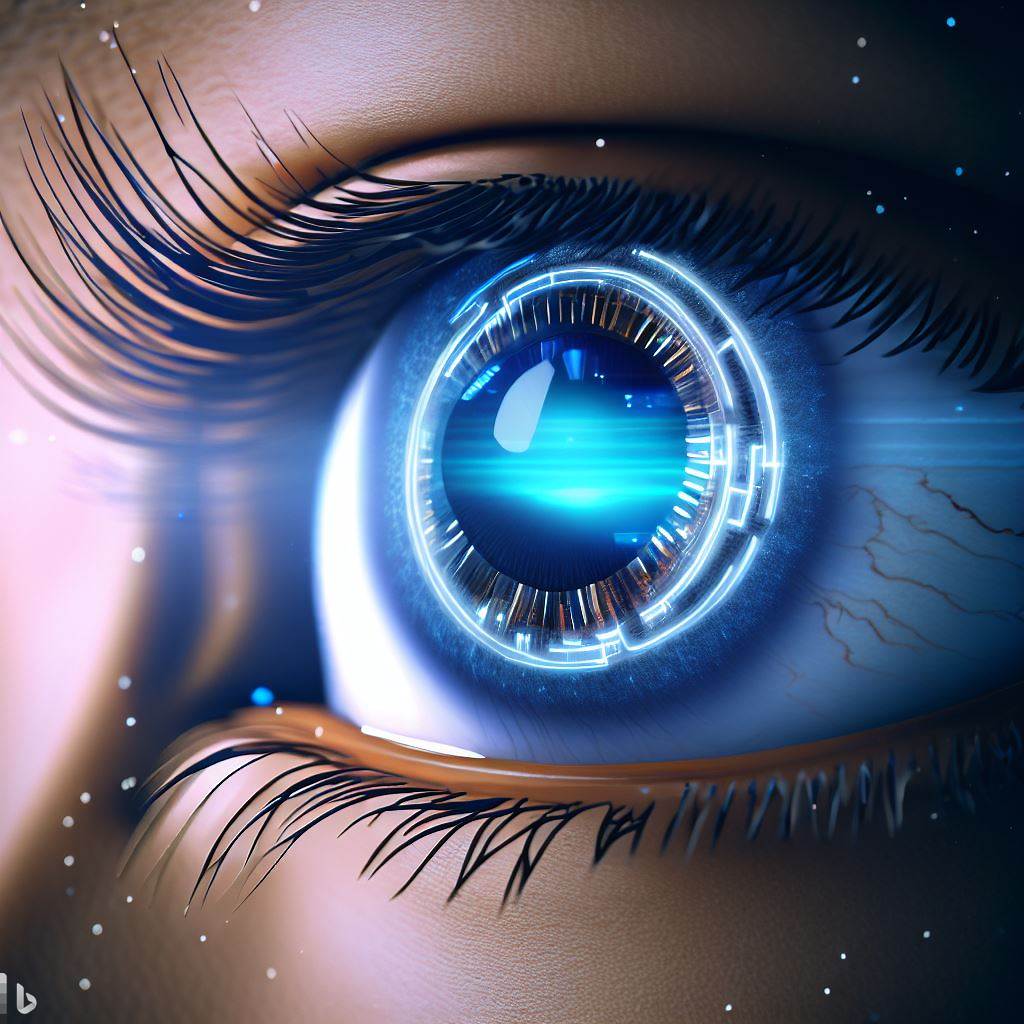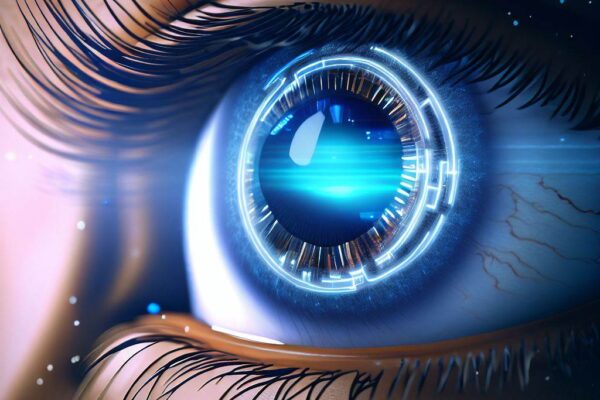My good friends Eric Sanner and Brandon Luhring wrote two excellent articles covering the past and the present in relation to AI. Their thought-provoking pieces reveal the current issues we grapple with and the invaluable lessons we can learn from our past experiences to better understand and shape the future of AI (1). In this blog we’ll delve into the future of AI generation, looking at what’s to come.
The AI space has, even in the gap since the last article, exploded with new tools, players, and inventions I am excited to cover.
And if you’ve been nervous about AI, this also is for you. Some trepidation is always a good thing when new innovations disrupt a space, but I believe AI is a force for good, and a reason for hope.

Human AI eye looking hopefully to the future
Brave New World
This blog is titled Looking to the Future, but if I’m honest I think we’re in it. In fact the image you just saw, Bing Image Creator made, a new image generation tool powered by DALLE. The following is a small list of just a few of the game-changers that have come out in a span of months. AI wrote the descriptions for all of this list.
Chat Tools
- ChatGPT-3: The third iteration of the ChatGPT series, which builds on its predecessors with better language understanding and improved conversational capabilities.
- ChatGPT-3.5: A version of the ChatGPT series that aims to strike a balance between AI performance and user safety, ChatGPT 3.5 incorporates important improvements based on user feedback and rigorous testing.
- ChatGPT-4: An advanced language model designed to generate human-like responses in conversations, the ChatGPT-4 has improved capabilities and accuracy compared to its predecessors.
- Bard: An AI system by Google capable of composing poetic and intricate text, Bard utilizes complex language models to generate creative pieces of written content.
Image Tools
- Midjourney 5: A versatile and adaptive AI-powered tool designed to provide users with step-by-step guidance and assistance throughout various journeys, tasks, or projects.
- DALLE: A deep learning language model that enables the generation of high-quality synthetic images from textual descriptions, DALLE has significant applications for content creation and visualization.
- DALLE 2: The enhanced version of DALLE, this image generation AI continues to improve upon its abilities and sophistication, allowing for even more detailed and accurate image generation from textual input.
- Bing Image Creator: An AI-powered feature within Bing Search, Bing Image Creator utilizes advanced algorithms to produce images corresponding to specific text queries, allowing users to visualize their search inquiries.
Productivity
- Merlin: An AI-driven program poised to perform wizardry-like feats, Merlin utilizes machine learning algorithms to suggest solutions, optimizations, and insights in response to various user queries.
- Microsoft Copilot: An AI-powered coding assistant that learns from your coding patterns, Microsoft Copilot offers relevant suggestions to help developers efficiently navigate the programming landscape.
- Copilot X: An advanced version of the AI-driven software development assistant, Copilot X provides more powerful suggestions and refactoring options, enhancing the user’s programming experience.
- Bing Search: A web search engine developed by Microsoft, Bing Search offers a comprehensive search experience including web pages, images, videos, and news through its user-friendly interface.
Additionally, OpenAI released GPT-4 (not to be confused with ChatGPT-4). The model is multimodal, meaning it can comprehend not only text but images and sound as well. This allows a far greater range of potential than previous models allowed, and unlocks the potential for AI to be used everywhere.
More Not Less
The number one most quoted fear about AI in general is that it will replace jobs. Will it, at some point, replace a large number of common jobs? Yes, it probably will. Is that day today, tomorrow, in a few years — will it even matter? In my opinion, not by a long shot, and here’s why.
How many painting artists made a living in 1838? They invented the camera a year after. How many artists made a living before and after the internet? Adobe Photoshop? How many people played Chess in 1996, one year before AI surpassed human ability to play Chess? How many people wrote code after creating the modern IDE?
The answer to every single question above is more. Inventions that everyone declared ‘killed’ an industry proved to do nothing but make it more accessible and profitable for everyone. The number of artists that make a living today is greater than any time before in history. IDEs made programmers faster, checked their syntax for them, and the number of Chess enthusiasts continues to grow — fast.
Personally, I believe AI will add jobs, a lot of them. Think of every school system you’ve ever been in. Was their website and student portal a picture of perfection and digital excellence? I mean, did they even have those things? My sister will soon attend UGA and myself and all other students wish someone would come along and revamp their roommate partner system. Only last year, a single developer would have needed years to properly build out a system that could handle 30,000 students and intelligently assign like students to each other. Now, that single developer could perhaps do it in months.
Real Hope for a Better World
Road deaths claim 1.35 million lives a year. Nurses spend up to a quarter of their time doing paperwork. Teachers spend time grading homework. Imagine a world where nurses suddenly had hours more time. Imagine Atlanta without traffic and accidents. I personally believe AI solves a enormous number of previously difficult discussions. If the elderly or those with disabilities, or any other afflicted party wanted consistent and individual care, it cost lots. Now, ChatGPT-4 with a memory of 25,000 words could precisely and accurately create meal plans, fitness routines, and more tailored exactly to an individual’s needs at the cost of cents on the dollar.
Note too that the development of AI will create new jobs and industries that we can’t even imagine yet (2). Just as the internet revolutionized the job market, spawning careers like social media managers, app developers, and data analysts, the AI revolution will likely result in new roles tailored to the emerging technology (1). As AI continues to evolve, people will be needed to design, develop, maintain, and refine these systems, as well as explore ethical considerations, privacy concerns, and potential societal impacts of AI (2).
To the Future
There will be legal problems, lawsuits, company drama, and likely so much more than could be imagined as we venture into the brave new world of AI. But there’s no putting it back — ChatGPT had more than 100 million users within the first two months, the utility and draw of AI is inarguable. And to me, this is the most exciting and wonderful advancement of the 21st century. I don’t see AI as replacing all our jobs and making life terrible – quite the opposite. AI will just do all the things you never liked doing to begin with, and let you focus on what matters to you the most.
This blog post is part of a series of articles about recently launched artificial intelligence (AI) generation tools (2020-2022). Don’t miss the full series: |
Bonus
(1): AI wrote this sentence.
(2): AI assisted writing this sentence.

